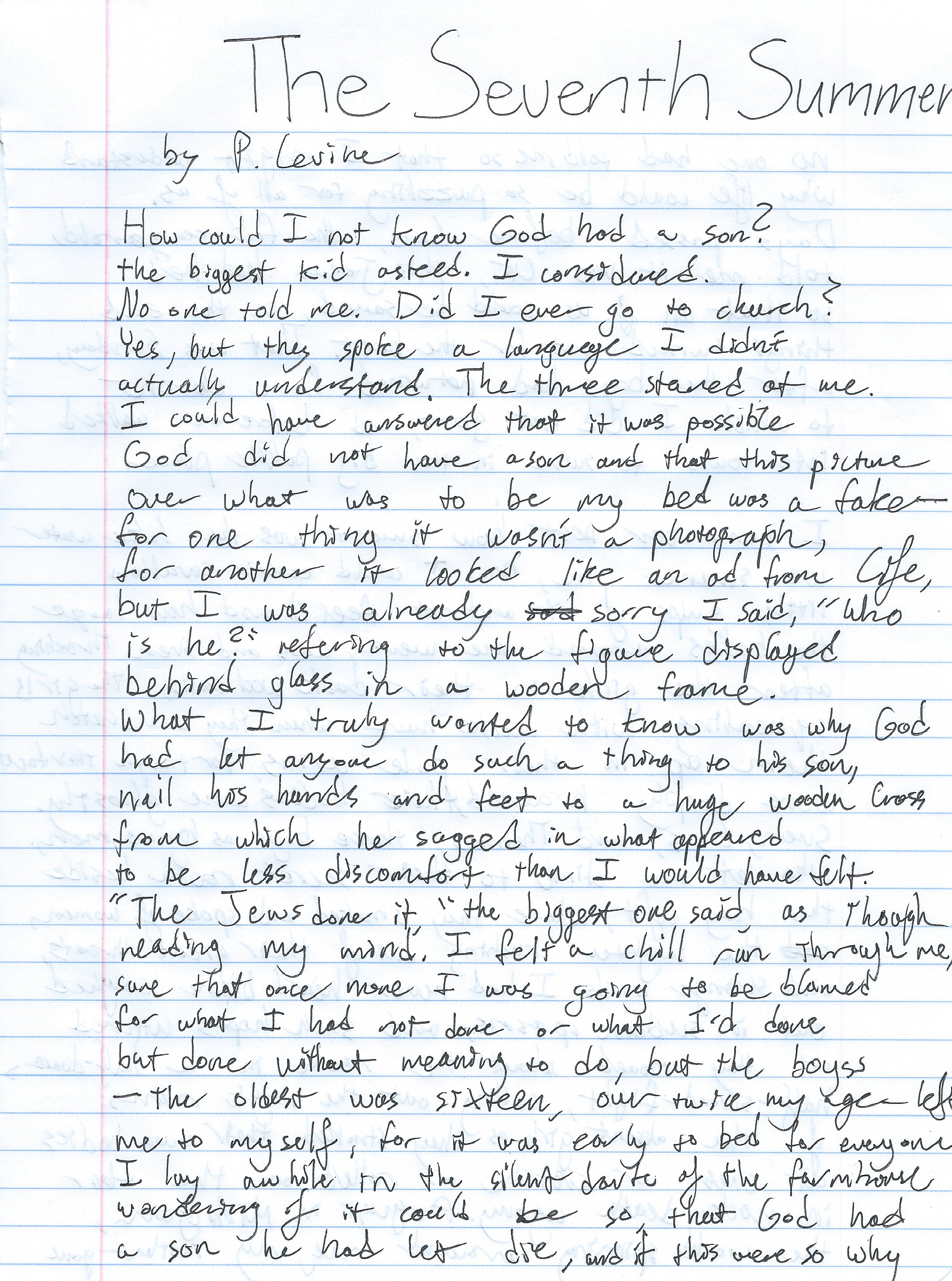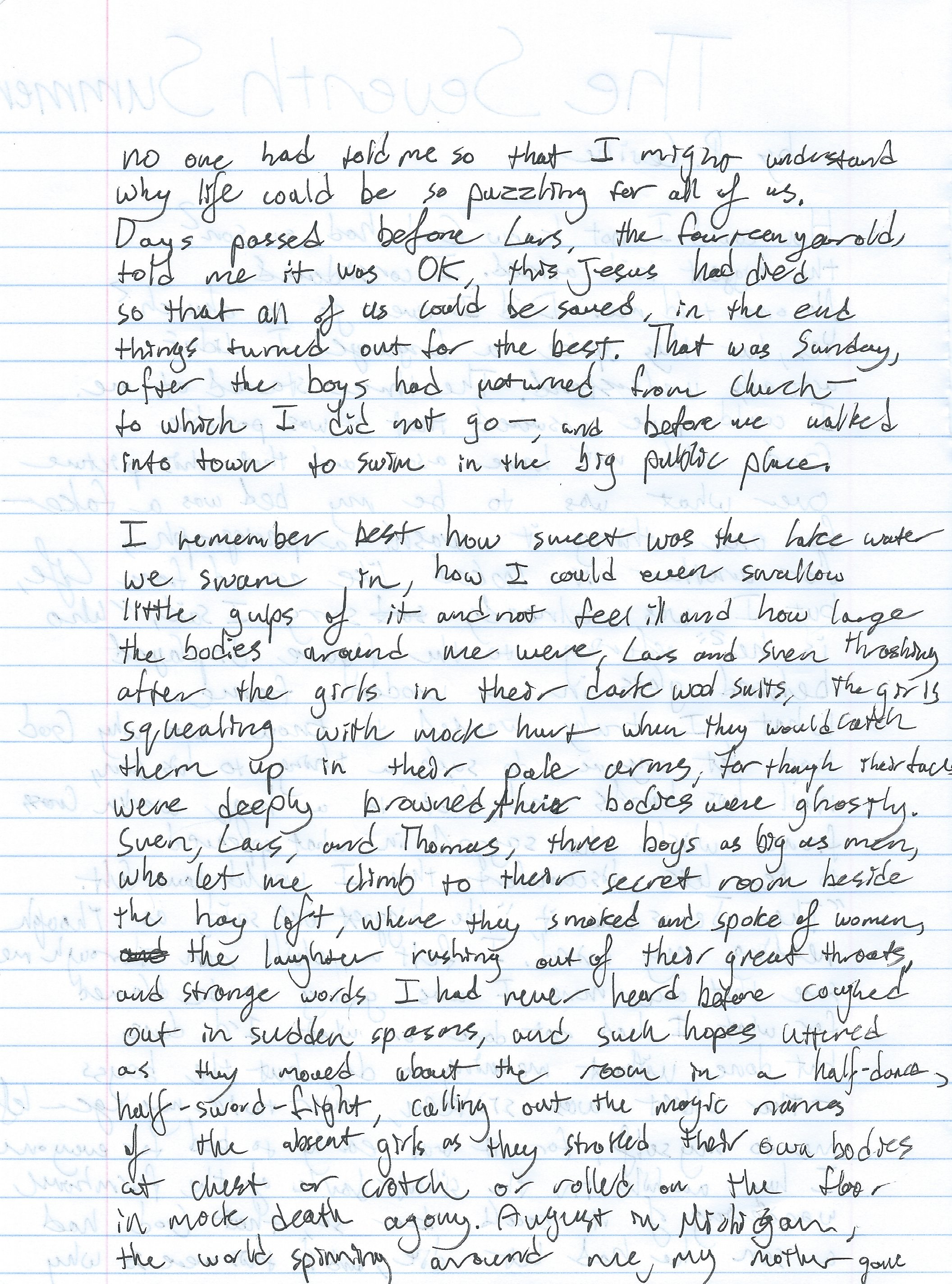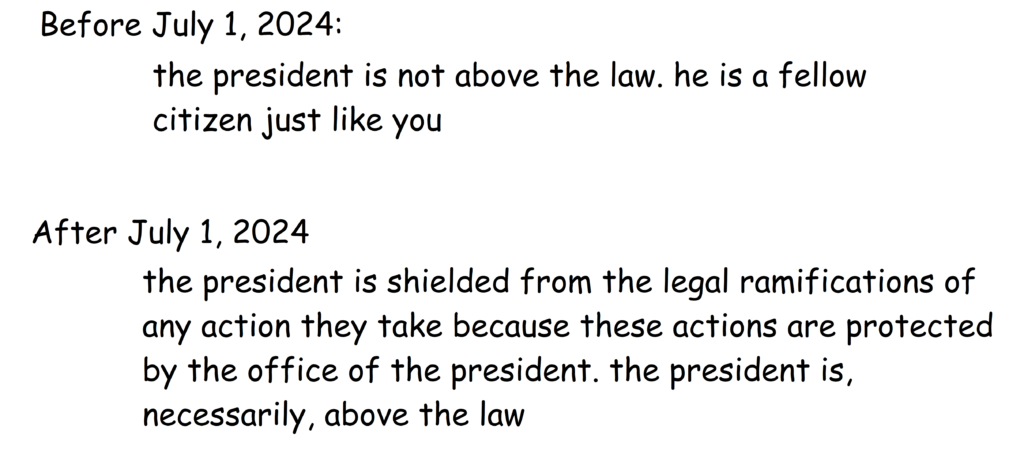Aaron had expected to move from his childhood home in Middleton (a massive single family home in Middleton Massachusetts with two showers that he has occupied alone for nine months) to his grandfather’s house in Malden at the end of May. 167 Floral ave was the address, and the house had housed three generations. Aaron’s mother had grown up on Floral Ave, and Aaron considered the place his.
Unfortunately, Aaron’s mother gave the room to Joe so that Joe’s girlfriend’s daughter could have a place to stay. They even took the mattress that Aaron had bought and unfurled from Costco months before. Purportedly, Joe was paying $3,700 to live there. Aaron was devastated. In retaliation, Aaron went to the house and dumped a pasta pot of water on his uncle Sam’s bed (Sam lived in the basement).
After that incident, Sam locked the door to the basement and hid the key. Aaron was still frustrated, however, so he went in the night a few days later and smeared dog shit around the handles and windshield of Sam’s car. Aaron was mad at Sam because he believed Sam was the real mastermind behind the sneaky sale, since Joe was his best friend. The truck was brand new, literally driven off the lot yesterday, a top of the line Ford. Aaron put some dog poop in the tailpipe hoping it might stink up the car of something. He got all the poop from his aunt, who kept it in little baggies in a metal bin next to her house. Aaron had collected it himself actually, because he walked his aunt’s dogs. Aaron smeared shit for a while, and then he went in to check the mail and went home.
Some time passed without any development on the matter. Sam and Felicia (Aaron’s mother) were already blocked, so they couldn’t reach Aaron anyway. They had Joe try to call Aaron, but Aaron hung up and blocked him too. At work, Aaron ruminated about all the mean things he would say to them when he eventually saw them again. The opportunity came quickly enough.
After visiting some friends in Malden, Aaron decided to stop by Floral Ave to check the mail and prepare the spot on the floor where he would sleep. It was still his registered address, and he had lost his lisence two weeks ago in New York so he figured he would check to see if it came in.
Aaron was walking around a bit. He noticed some of his grandfather’s pictures had been taken down from the wall. Particularly, one of his favorites was missing without a trace: his grandfather out cold on a beach chair with his little wooden tobacco pipe still in hand. As he was perusing, Aaron heard Joe come down stairs.
Aaron didn’t feel like talking to Joe, so decided to go on the back porch. The door was locked with the key in it. Joe followed him out. Joe tried to say “Hi” and Aaron squeaked a weird high pitched hi back. Joe followed Aaron out onto the porch and Aaron tried to say, “No you don’t have to do that.” Aaron stood over the porch looking out over the road. It was warm and a little humid. A single streetlight glowed bright white across the sidewalk.
Aaron tried to find a place to look anywhere but at Joe. Joe just stood there, silhouetted black against the light from the doorway.
“Can you leave me alone?”
“I want to know what kind of state you are in.” Joe finally said.
“Oh.” Aaron started to walk toward Joe, holding out his hand. “Let’s have a truce. I am satisfied. I won’t do anything else.”
They shook hands. Joe held up his arms and asked for a hug. Aaron stepped back.
“No.”
“Come on buddy.”
“I don’t want to give you a hug.” Aaron was circling around Joe to get back to the door.
Joe was insistent. “I want to be friends.”
“I’m not your friend Joe. I don’t like you. You are a deceptive person.”
Looking back, Aaron realized this was the tipping point. If he hugged Joe there and pretended to be his buddy, Joe probably would have let him go. But Aaron really hated Joe, and Joe did not like to be insulted.
Aaron walked through the house and tried to go upstairs. Joe was upset, he told Aaron, “I’m gonna call your mother so I don’t lay any hands on you.”
Aaron, climbing up the stairs faster now, said, “We don’t have to be friends, Joe. I’m going to live here and you’re going to live here and we don’t have to talk to each other.”
“I don’t want to live like that.”
Aaron got to his grandfather’s room and shut the door behind him. He texted his ex girlfriend, who he knew would be fascinated by this drama, “Just letting you know in case of witness needs, Joe just said ‘I’m gonna call your mother so I don’t put my hands on you’. Threatening violence in my own grandfather’s home.”
Joe opened the door and came in. The room was a mess of boxes and blankets and old furniture, piled across the bed and floor. They were planning to move all of Aaron’s grandfather’s things to the attic. He wasn’t even dead yet.
“Leave, Joe.”
“Buddy, you have to go.”
“What?”
“You have to go.” Joe was standing in the door way.
“This is my grandfather’s house. I’ve lived here for years.”
“You don’t live here. You have to go.”
“No. I live here.”
Joe didn’t budge. His girlfriend, Molly, a schoolteacher, came up behind him. She looked tired, eye bags all dark.
“Joe Joe, come on.” She tried to pull him away.
“Aaron, leave.”
“No.”
“You can’t stay here. You have to leave.”
“Please leave me alone Joe.”
Joe was getting frustrated.
“There is a little girl in the next room over, I am not leaving you alone with her.”
Aaron was sitting on the bed with his feet up on a piece of furniture. He had even taken his boots off.
“She’ll be fine.”
“You aren’t stable Aaron. You are scaring us.”
“Did I freak you guys out that bad with the dog shit? My uncle deserved it, I swear.”
“We don’t know what kind of state you are in.” Joe said.
“I am fine, Joe. Really. I have satisfied my taste for revenge with my uncle.”
“You can come back tomorrow, please Aaron.” Molly pleaded. “We can’t do this right now.”
“I had no intention of staying here tonight. I just wanted to move some boxes.” And indeed, the room that Aaron intended to share with his grandfather was littered with junk that made just walking through the room hazardous.
“Please just go. I don’t trust you, Aaron.”
“I will not.”
Joe’s patience was thinning. “Shut the door Molly.” And he went to push his girlfriend out the door to close it.
“Are you going to hurt me, Joe?”
“No, but I want to beat the shit out of you.”
“I knew you were a violent person Joe. Is that how you solve problems, hurting people?”
“No, I don’t hurt people. I’m a nice person.”
Aaron leaned back in the bed, practically laying down, and Joe stood over him, trying to crush Aaron with his beady, black eyes.
“Get out of my room Joe!”
“I am not leaving here while that little girl sleeps in the other room.” The whine of a dog could be heard behind a door somewhere. That dog, some kind of pit bull mix or something, had growled at, jumped on, and nipped at Aaron.
The back and forth went on a bit longer before Sam came up the stairs from the basement. Whether or not Joe woke him up or the commotion did is unknown.
Sam tried to shush them all. “There is a kid sleeping next door, Aaron. Why are you bothering these people?”
“They came in here. They started with me.”
“Aaron, it’s 11 o clock at night. We have work in the morning. Why are you doing this?”
“I just want to be left alone, please leave me alone.”
“You have to go Aaron.”
“No, I am not leaving.”
“Aaron you can’t stay here.”
“No.” Aaron persisted.
“Aaron, this isn’t your house. You don’t live here.” Joe finally said.
“Oh, it’s just my mattress and my desk your girlfriend’s daughter is sleeping on?”
“We’ll pay you. We can talk about it in the morning when you come back.”
“Just leave me alone.”
“No. Leave me alone.”
“We aren’t leaving until you go.”
“Then we are going to be here a long time.” Aaron replied, and lounged backwards in the bed with his hands behind his head.
“Leave.”
“No.
“Leave Now.”
“No, I’m not leaving. We are going to be here all night.”
“You have to leave.”
And so on. Sam was in and out at various times, as was Molly. Joe finally got the door closed and tried to pin Aaron against the bed. Aaron punched him back.
“Aaron just punched me! See, he’s crazy!”
“Punch me again, Joe. Do it.”
“I’ll break your face.”
Aaron tried to start recording at this point, but his phone stopped recording the second the screen turned off. This is a major design flaw of Android phones, clearly. Why does a recording app not come stock? In dangerous situations like these, individuals need to be able to quickly document the situation for legal and safety purposes.
“Why are you even here?” Molly asked.
“I wanted to move these boxes downstairs so I could set up my bed.”
“You said before you wanted to just walk around. See Aaron, you aren’t right in the head.” The gaslighting began in force. For the rest of the night, Joe would question Aaron of events as they happened, loudly commenting on Aaron’s stability and state of mind.
“Why did you smile? See you are smiling?” Molly asked, presenting her case.
“Do you guys think I am crazy?” Aaron felt clear headed and alert, completely in the moment. His nerves were firing like crazy.
“You aren’t right, Aaron.” Joe tapped his head to indicate craziness. “It’s because you are half-retard. You’re retarded.”
Aaron responded by letting Joe know he was a scumbag.
Sam came in with the phone again. He had his mother, Aaron’s grandmother on the line. She asked Aaron to go home and get some rest, and she and he would be back in the morning.
“I’m sorry Nanna, but I can’t leave. It will be the last time I ever step foot in this place.”
“No honey, we can work all this out in the morning.”
“Nanna, they are going to change the locks. They are going to lock me out of my own grandfather’s home.”
“I’ll go with you tomorrow, honey, please just go home and get a good night’s rest.”
Aaron continued to resist. “We are going to be here a long time.” He pulled out his phone and checked the time. “Yeah, I’ll give it till six am and then I’ll leave. God this is going to be a long night.”
“We’re gonna call the police,” Molly threatened.
“Good, do it. Do it, call the police.” Aaron looked at Sam. “Imagine the story. Being arrested in your own home.”
Sam simply said, “This is between you and your mother. Talk to her about it.”
Aaron responded, “This is extremely frustrating Sam. Extremely frustrating.”
“I know,” Sam said.
“What, are you waiting for Lenny to go cold? Is that what you are hoping for, Lenny to die?”
“Yep,” said Sam.
Joe was getting impatient again and wanted to beat up Aaron.
“You don’t even have a formal lease, Joe. You live here under the table.”
“Oh yeah? I pay your mother every month to live here. I have texts back and forth.”
At one point, Joe tried to tackle Aaron again. Aaron pushed back and slammed Joe against the wall. At the same time, Aaron reached down and grabbed Joe’s balls, squeezing as hard as he could. Joe went to the floor. Sam and Molly separated them.
“Do it, hit me again, Joe.” Aaron got back into bed and sat, criss-cross apple sauce. “I have an idea Joe, just let the dog out and let it bite me. You wont be responsible that way.”
“The dog would never bite!” Molly screamed.
“Aaron, you don’t live here. I pay rent. You don’t pay shit. The mattress isn’t even yours, your mom paid for it.”
“You have no idea, Joe.”
“What do you pay?”
“My parents use my name in a fraud scheme that nets them $3000-“
“Nothing. You pay nothing.”
“You have no idea about any of that, Joe. Leave me alone.”
“You pay nothing. NOTHING. I own this place.”
Sam tried to pipe up; “You smeared shit on my brand new truck, that cost me one hundred thousand dollars!”
Aaron wiped his eye like he was shedding a tear. Sam humphed, “See!”
“It came off in the car wash, right? It was harmless, and you deserved it.” Aaron figured that Sam would
“For what? I had nothing to do with any of this.” Sam insisted the entire arrangement was between Aaron and his mother. Even though Aaron had said to Sam’s face and over the phone repeatedly for months that he would be moving to Malden and wanted that room as soon as Mike moved out. Mike took his fucking time doing it.
“Sure, Sam. You just take a little money now and then when you need it.” Aaron smiled a shit eating grin. “Anyway, I promise from the bottom of my heart I won’t do anything again. Let’s have a truce.”
Sam refused.
“Come on, Joe and Molly please leave. I want to talk to my uncle. We haven’t really had any time to actually talk, especially with the divorce and all.”
“Now is not the time Aaron. You need to leave.”
“LEAVE! GET THE FUCK OUT OF MY HOUSE.” Joe was screaming now, right into Aaron’s face. Aaron’s phone was ringing. His dad had been trying to call him nonstop.
“Shut up Joe.”
Joe kept calling Aaron a retard. He grabbed a big wad of Aaron’s grandfather’s stuff and threw it at Aaron hard.
Sam left again, talking on the phone. Molly tried to plead with Aaron while Joe continued to demand Aaron leave, sometimes up close and angry, sometimes back. Joe was saying something to Aaron when Aaron cut him off and tried to look behind him into the hallway where Sam was talking on speaker phone with some man.
“Wait wait, who is he talking to?” The voice was weird.
Sam came back in and handed the phone to Aaron. It was another man named Joe, Aaron’s grandma’s boyfriend.
“Hi Joe,” Aaron said. “Sorry you have to see me like this.”
The old Joe, off to the side, “You can’t SEE him, he’s on the phone.. see, he’s crazy!”
The new Joe on the phone said, “Hi Aaron. What the hell are you doing there?”
“It’s my grandfather’s house, I have a right to be here.”
“You don’t live there! What, do you want to live in New Hampshire, Middleton, and Malden all at the same time?” Aaron thought it was ironic that his grandfather’s ex wife’s boyfriend was lecturing him about this.
“I am my father’s son!” Aaron let out a laugh. It sounded fake, and he cringed at himself immediately. Aaron sometimes wondered if his weird sense of humor was really that unnerving.
“It is not your house! Your mother made a decision about it, you have no right to be there.” It was a little strange that Aaron’s grandfather’s ex wife’s boyfriend was
“My grandfather said I could live here.” Lenny had done exactly that, over and over for years. Aaron had lived with with Lenny after college and adored it. The freedom to work and create was incredible, and in a house with so much history! The Malden Public School System gave Aaron his first real job.
“It is not your house for Gods sake! You live in Middleton, go back to Middleton.”
Suddenly, Aaron had an idea. “I’ll leave if you pay me $300 dollars.”
Joe was in disbelief. But Aaron was looking at Sam, and Sam nodded.
Aaron continued, “Actually $350, for the mattress, desk, and sheets and stuff.”
“Okay, deal.” Joe said.
Molly was aghast. Sam reached out his hand for some reason and Aaron shook it.
Chaos continued, Aaron saying something flippant and Joe getting angry again. Molly finally demanded to know Aaron’s Venmo and he gave it to her. She showed him her phone and he selected the right profile.
“Leave!”
“I’m not leaving until I get my money!”
Molly wouldn’t send it until Aaron left.
“No way, if I leave now you won’t send it.”
“This is so disrespectful. You are so disrespectful,” Molly said, covering her face.
“No, Molly, you are right. I have no respect for you whatsoever. I think you are an awful person.”
Molly did finally send it, and Aaron confirmed on his end. Molly’s Venmo message read: “$350. To get you out of my house.”
Satisfied, Aaron prepared to leave. While he was tugging on his boots and tying them, Joe got agitated again. “You aren’t leaving until you give me your key.”
“I’m not giving you my key. Just change the locks.”
Aaron then tried to stand up on the bed, and Joe immediately pushed him down against the wooden frame at the end. Aaron punched him right back.
“HIT ME AGAIN JOE!”
Sam and Joe got up in Aaron’s face, like mobsters, and demanded he hand over the key. Aaron stuck his hands in his pockets, feeling his wallet, keys, phone etc. He looked at them and said, “No way. Change the locks yourself. You know how to do that, don’t you lugnut?”
Joe suddenly turned into the hallway and tried to open the door with the dog behind it. “Let the dog out. Come on, let the dog out.” Molly stopped him.
“See, it was a good idea, right?” Aaron smiled.
After some more posturing and shoving, they finally let Aaron go past, but they kept on his ass. As Aaron went to climb downstairs, Joe tried to push him down the steps. Aaron grabbed him back and tried to pull him with him. Molly pulled him off.
“Nice Joe, awesome. Keep hurting me. You are a violent person, a man-child. You have to hurt people to get what you want.”
“I’m a child! You’re a child.”
They finally pushed Aaron to the mudroom. Aaron had the glass door ajar and was preparing to leave when Sam said something to him. Aaron didn’t hear it, but Sam was right up against him. Aaron placed his index finger right on Sam’s chest and said to him in a low voice, “don’t ever betray me again, Sam. Don’t ever betray me.”
Sam lost it then. A pair of steep stone steps lead down to the concrete sidewalk below the door. Sam grabbed Aaron and attempted to throw him down the stairs, but Aaron dug in and twirled. He got the upper hand and managed to swing Sam so that he was about to tumble down the stairs. Just as Aaron went to heave all his weight against his uncle, Joe came from behind and pushed Aaron. Aaron had just enough time to grab Joe’s testicles again and squeeze. All three tumbled down the stairs, Sam sprawling on the sidewalk and Aaron on his back against the stairs. His arm hurt– it had been scraped.
Sam pulled himself up in the blink of an eye and was on top of Aaron. Joe was on the step above, loosely holding Aaron’s shoulders down while Aaron’s fist clung to his balls. Sam got right up close to Aaron’s face and whispered. “Don’t say a word about this to my kids or I’ll kill you. Don’t say a fucking word.”
“Of course I am going to tell them, Sam. I’m going to text them the second I get in the car.”
“You better not do anything to my kids.”
“I love your kids, Sam. They are my best friends.” That Sam could not understand that baffled Aaron. How absolutely obliterated does one’s sense of love have to be to think otherwise?
“Good,” Sam said.
“You gonna hold me down forever?”
Joe let go, but he slapped Aaron in the face as he got up. Aaron pushed back, yelling “Hit me again Joe, see what will happen.” Aaron wondered what the neighbors thought of this shit show.
Aaron started to walk to the car. Joe called after him that he was “half retarded” again, but then he came down the stairs and started following Aaron.
“Hey buddy I just want to shake your hand. Hey I just want to shake your hand come on.”
“Get away from me Joe, you are a creep.”
“Come on, I just want to hug you.”
Aaron had his key in his hand now, held like a knife. Joe reached out and touched Aaron’s shoulder and Aaron pushed the key against his chest. Aaron backed to the driver side door of his car.
“Go ahead Joe, break my car. I know its what you want to do.”
Surprisingly, Joe didn’t. He stood ominously beside the car as Aaron threw himself behind the wheel. He shifted into reverse and started to get the hell out of there.
“Fuck you Joe!”
Joe made after the car but Aaron pulled away. Adrenaline was pumping through him like crazy, he felt wired. After making it a ways down the street, Aaron decided to finally call his dad back.
“Dad, they are psychopaths, they are so insane.” Aaron was wired and tired at the same time. He gently turned the wheel to turn out of the street.
“Yeah, Sam has always been like that. If he wanted a new bike, he broke his old one and made him mom buy a new one. He tried to crash his truck once to collect insurance so he could get a new one. When they wouldn’t pay, he saddled his mother with the bill.”
They talked for a while while Aaron drove up Route 1. He noticed a restaurant he didn’t recognize in the Jimmy’s/IHOP lot. Casa Vallarta Mexican. Maybe it was good.
They chatted. Aaron’s dad told him he could stay in Middleton as long as he liked, he’d give him any money he ever needed, that he just needed to get a job. Aaron had to stop himself from crying.
“I’m such a loser.”
Him and his dad talked about redoing some of the floors in Middleton and painting the walls. Gary had a lot of ideas and plans that gestated for years.
Aaron’s grandfather called then. Aaron hung up on his dad to answer it.
“Hi Papa.”
“Aaron, are you alright?”
“Yeah, I’m fine.”
“I’ll sort this out when I get home in two weeks.” Lenny was a snowbird, he stayed in Florida during the winter. He liked to drive the other old people around.
“It’s okay papa, don’t worry about me.”
“It’s just as much your house as it is mine, Aaron.”
“Well, they sold my room papa. I loved that house and I loved living with you. I don’t know why my mom did that.” Aaron was ugly crying a bit as he said this.
“I’m coming back in two weeks and I’ll sort it out.”
Aaron drove home to his estate in Middleton, parked the car, and immediately began writing this document. It is 4am.
***

























